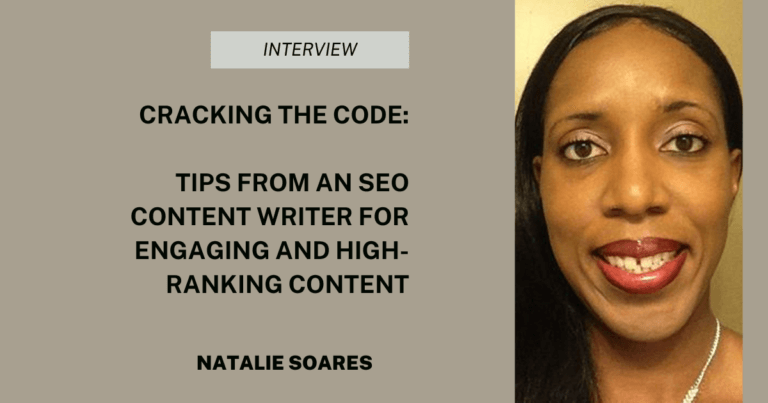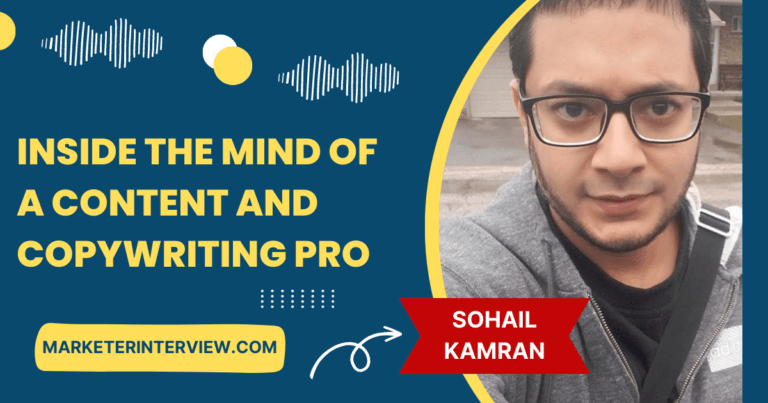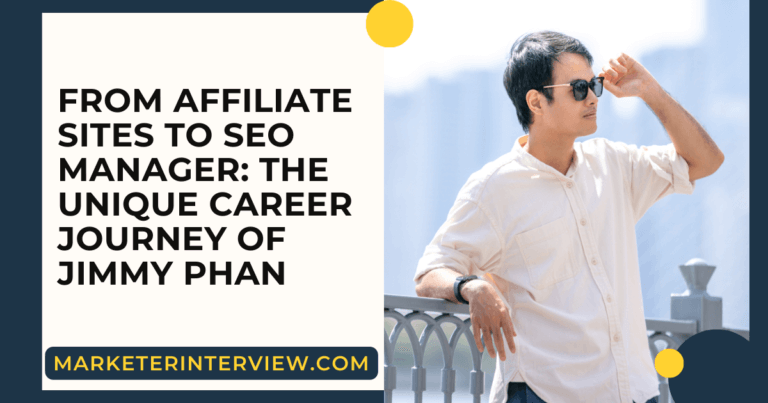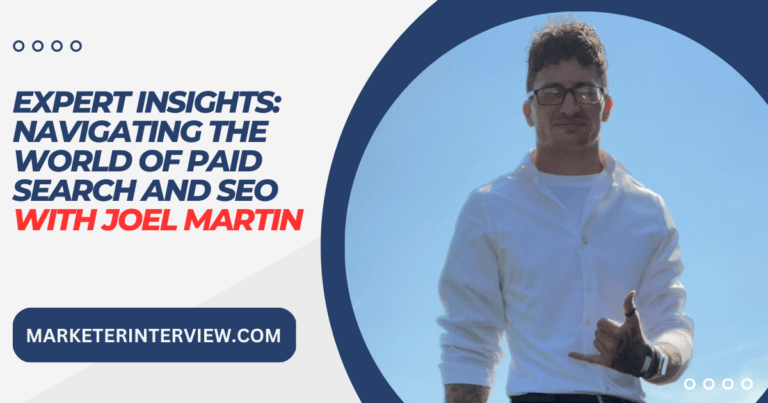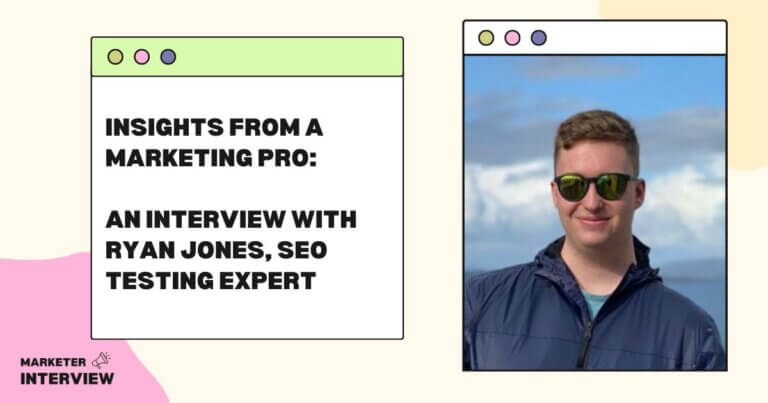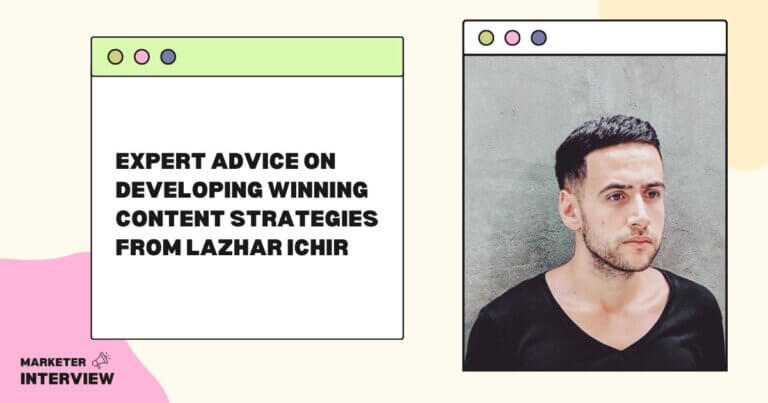Unlocking the Power of SEO: An Exclusive Interview with Laura James
Welcome to Marketer Interview, where we dive deep into the minds of marketing experts to uncover their strategies, insights, and experiences.
Today, we’re excited to introduce you to Laura James, a seasoned SEO Manager at Uscreen. Laura’s expertise spans various fields within SEO, from Content to Video SEO and everything in between.
With her passion for trust, honesty, and reliability, she brings a unique perspective to the marketing world. Laura’s career is a testament to her dedication to the ever-evolving world of SEO.
Contents
- 1 Can you share your journey into the marketing field, particularly how you found your way into SEO?
- 2 SEO is a dynamic field. What are the most significant changes you’ve witnessed in the industry throughout your career, and how have you adapted to them?
- 3 One of your areas of expertise is AI in SEO. How do you see artificial intelligence shaping the future of search engine optimization, and what AI tools have you found most effective in your work?
- 4 Video SEO is gaining momentum. Can you share some tips and strategies for optimizing video content to enhance visibility in search results?
- 5 SEO is often seen as a complex and ever-changing discipline. What are your fundamental principles for ensuring long-term SEO success?
- 6 Are there specific challenges you’ve encountered while working with SaaS clients and start-ups, and how have you overcome them?
- 7 In 2022, you moved from the UK to Ireland. How has this change of location influenced your approach to marketing and SEO?
- 8 Could you share some insights on your interests outside the office, like gaming and your passion for travel, equality, social justice, and ethics? How do these aspects of your life inform your approach to marketing?
- 9 Finally, for those aspiring SEO professionals, could you recommend essential tools and software that have been instrumental in your career?
As many people do, I struggled to enter the industry I’d trained for at college and university. I wanted to be a film or TV producer, but if you’re not willing to work ridiculous hours for free before you get your ‘big break,’ there’s not much hope.
I’d become increasingly disenchanted with the industry as I worked towards the end of my degree. I learned it wasn’t about hard work, passion, or dedication. Success depended on how much kit your family could buy you, how few responsibilities you had, how loud you shouted, and, often, on being male.
I found myself lost in my early twenties. I’d always been in control and knew what I wanted, but not anymore. I fell into some soulless admin work. It paid the bills, but I wanted more than that for me.
Researching into roles and industries, I could pivot my media experience into marketing could be a good option. I knew I didn’t want every day to be the same. I wanted a challenge. I wanted creativity. There were a lot of false starts and missteps. I’m pretty sure I almost got a scam job once! Eventually, I learned about SEO and noticed that more job openings were popping up in my area.
With a lot of research and memorizing jargon, I managed to bag my first junior SEO consultant position with no previous experience. To say it was a whirlwind from there is an understatement. I had to learn so much and so quickly. Thankfully, I landed in a supportive team with a client roster that lent itself to getting hands-on with different verticals, audiences, CMS, and problems.
As time went on, I made many mistakes, learned from them, moved up the ranks, switched agencies, and eventually made the jump to in-house.
SEO is a dynamic field. What are the most significant changes you’ve witnessed in the industry throughout your career, and how have you adapted to them?
So much has changed in SEO since I started in mid-2015. One of the most significant shifts was transitioning from a keyword-centric approach to a user experience-focused strategy.
The emphasis used to fall heavily on keywords and links. Today, while these elements are still vital, the focus has broadened to include user experience, content relevance, and value delivery.
Mobile-first indexing by Google was another pivotal moment. I remember the scramble to incorporate responsive sites into the agency’s repertoire and having clients throw money at us to build one – fast.
We suddenly became UX specialists, whipping our mobile phones to test the latest site launch. Adapting to this change meant not just making websites mobile-friendly but also considering the mobile user experience in every aspect of SEO strategy.
AI’s entrance into SEO was another curveball. BERT wasn’t just an update; it felt like a seismic shift. The content wasn’t just about keywords anymore but conversations. I spent nights diving into articles, webinars, and anything I could get my hands on to unravel the mystery of crafting content that resonated with algorithms and humans.
And now, with Google Bard and SGE, SEO feels like it’s come of age. It’s not just technical but personal and intuitive. Every piece of content is a dialogue, an opportunity to connect, engage, and understand the audience on a deeper level.
Being an SEO means you have to get used to and embrace change. If you love the status quo, you might find another career. The scope of control is so narrow that adaptability is an essential part of the job.
One of your areas of expertise is AI in SEO. How do you see artificial intelligence shaping the future of search engine optimization, and what AI tools have you found most effective in your work?
I’m always excited to talk about this. AI is revolutionizing SEO in many ways, one by aiding productivity and efficiency, but primarily by thoroughly shaking up the search results. AI has been used in the search for many years, but SGE and Bard are on another level. The very nature of them (informational and conversational) could mean some sites may struggle to attract as many clicks as they used to.
Who hasn’t been impressed with ChatGPT?! It’s been a game-changer in content creation, offering insights and suggestions that are both SEO-optimized and engaging for readers. It’s like having an extra brain that you can bounce ideas off of, helping to craft content that resonates and ranks. It’s not perfect by any means, but if it were, many of us would be out of a job!
SurferSEO is another favorite of mine. It’s akin to having a magnifying glass that offers a detailed view of the SEO landscape. With actionable insights, it aids in refining content strategies to align with current trends and competitors, ensuring we’re always a step ahead.
I also can’t overlook timeOS. It has been instrumental for me in streamlining my meeting note-taking and follow-ups. I can now focus on what people are saying and contribute to the meeting effectively without worrying about missing something from my notes.
And then there are extensions and add-ons like SheetAI. The ability to automate and optimize data analysis directly within spreadsheets has made SEO data management and manual tasks like writing metadata and alt text far more efficient.
In essence, AI is weaving itself into the fabric of SEO, making it more intelligent, dynamic, and efficient.

Video should be a part of every SEO’s arsenal, but often, it’s left by the wayside and deprioritized – usually due to a lack of understanding about the benefits. It’s a narrative I’m keen on changing.
From my experience, integrating video content effectively into SEO strategies starts with a keen understanding of the audience. Knowing what resonates with viewers, the type of content they engage with, and how they consume video content is foundational. It’s about creating videos that are not just visually appealing but also aligned with the viewers’ preferences and search intents.
Transcripts are a goldmine, often overlooked. By including a transcript, you’re making the video accessible to a broader audience and giving search engines more content to index. It’s a win-win that enhances both accessibility and visibility.
Thumbnail selection is also pivotal. A compelling thumbnail can significantly increase click-through rates. It’s like the cover of a book; it should be inviting and offer a snapshot of the video’s content. There has been a lot of research around what works best in a thumbnail. Mr. Beast, one of the biggest YouTubers on the planet, recently noted that his videos are more popular if he appears in a thumbnail with his mouth closed as opposed to open. Who’d have thought?
And let’s not forget the power of structured data. It still baffles brands and SEOs alike, but if you can get a thorough grasp of schema and structured data, it can boost your efforts. Video structured data, mainly if it includes a transcript, provides search engines with rich context about the topic, content, and relevance.
SEO is often seen as a complex and ever-changing discipline. What are your fundamental principles for ensuring long-term SEO success?
Producing content for users and not search engines is and will always be crucial to SEO success. No matter what the algorithms throw at us, if you’re creating content that your audience loves, you will succeed.
Building on that, another principle I value is adaptability. The SEO landscape is fluid, and adapting to changes can make or break your career. I always do my best to stay informed about the latest trends, algorithm updates, and emerging technologies. It’s about being proactive, anticipating changes, and tweaking strategies to align with the evolving landscape.
Transparency and ethics are also at the core of my approach. In a field where shortcuts and black-hat techniques can be tempting, I’ve found that integrity pays off in the long run. It’s about building trust with both the audience and the search engines. Ethical SEO is sustainable SEO.
Lastly, the principle of data-driven decisions. SEOs cannot get by assuming every strategy and technique is one size fits all. Every site and vertical is different. Prior learnings are helpful for context, but you need first-party data used holistically with third-party data to make informed decisions.

Are there specific challenges you’ve encountered while working with SaaS clients and start-ups, and how have you overcome them?
One of the most common issues SaaS companies have with SEO is bridging the gap between what their audience is searching for and asking and how the brand talks about its products and services.
Often, there’s a real need for education, both for internal stakeholders and audiences. If your audience is looking for a product that does X, but you refer to it on the website as Y, your potential customers may struggle to find you. If they do find you, they may not understand how your solution is better than Y or how it can help them achieve X.
It’s all about education and, eventually, category creation, whereby you carve your niche using terms you’ve created. You need to create content that attracts users and buyers where they are. By that, I mean using keywords, ideas, and language they’re used to and comfortable with. Then, once they’re on the site and they’ve bought into your brand, you reeducate them on the REAL solution and why you’re the best fit to solve their pain points.
You’ve worked in various industries like eCommerce, travel, education, and retail. How do you adapt your SEO strategies to suit the specific needs of these diverse sectors?
In my journey through different industries, I’ve learned that each does have its unique SEO needs. However, it always boils down to satisfying what the buyer or end-user wants. The intent and expectation.
Obviously, in eCommerce, optimizing product pages and enhancing the user experience is crucial. Product SEO is a science in and of itself. Getting it right relies heavily on both on-page and technical SEO and with the size of some eCommerce sites, the latter can be particularly tricky. Pagination, duplicate content, crawling, and indexing can become problematic as sites grow.
As you can imagine, the travel sector is enjoyable. Living out travel fantasies through keyword and content research makes it much more manageable. Content needs to not only highlight destinations, excursions, and accommodation but also sell the dream. Stay attuned to seasonal trends is essential, too, and always ensure the content is as current and relevant as possible.
Education is a very different ball game. Here, I’ve learned the power of authoritative and informational content. I focus on creating resources that answer the pressing questions of students, learners, and parents. Building trust is critical, and ensuring the website is a reliable, accessible resource is crucial.
The beauty of SEO lies in its fluidity. Each industry teaches me something new, and adapting to each, crafting strategies that are as unique as they are effective, is what I’ve come to love about this journey.
In 2022, you moved from the UK to Ireland. How has this change of location influenced your approach to marketing and SEO?
The move to Ireland has been more of a personal journey than a professional transformation. However, the change of scenery has offered me a fresh perspective that has been quite enriching.
I’ve always believed that a change in environment can stimulate creativity and innovation, and this move has proven that for me. Although I’m not directly working on SEO for Irish audiences, being in a new country has exposed me to diverse cultural nuances and business landscapes. It’s like working on International SEO, but the website is your life!
I’ve found that I’m asking more questions, exploring new angles, and considering diverse perspectives in my strategies. It’s not so much about changing my SEO tactics but enriching them.
Moving to another country has offered me a broader view of the world. It’s a reminder that SEO isn’t static, and there’s always room to learn, adapt, and evolve, no matter where you are.
I’ve always felt a bit weird describing myself as a gamer. When people think of gamers, there’s a stereotype of sweaty teenage boys battling against each other online. Some gamers are like this, and there’s nothing wrong with that, but when you don’t fit that stereotype, there’s almost a question of, “Well, you’re not a gamer then, are you? You play games, but you’re not a gamer.” As far as I’m concerned, if you play any game regularly and enjoy it, you’re a gamer.
As for my other passions and interests, equality, social justice, and ethics seem to serve me well in my chosen career, especially now that I’m a manager, too. I don’t think you could be a manager or work closely with others successfully without caring about what happens to them.
Whether it’s because of where they’re from, the color of their skin, their gender identity, or their disability – you have to care, you have to be sensitive to it, you have to be an ally. It’s not about getting it right all the time (because I don’t) or never saying the wrong thing. It’s about giving a damn and allowing someone to be their full and authentic self around you.
Finally, for those aspiring SEO professionals, could you recommend essential tools and software that have been instrumental in your career?
Aspiring SEO professionals would do well to invest some time into Screaming Frog. Not only is the tool the best out there for SEO audits and investigative work, but the creators also publish endless amounts of insightful blog posts to help you get a better grasp on SEO. I’m still learning new things about how to use the software and get the most out of it for my audits!

